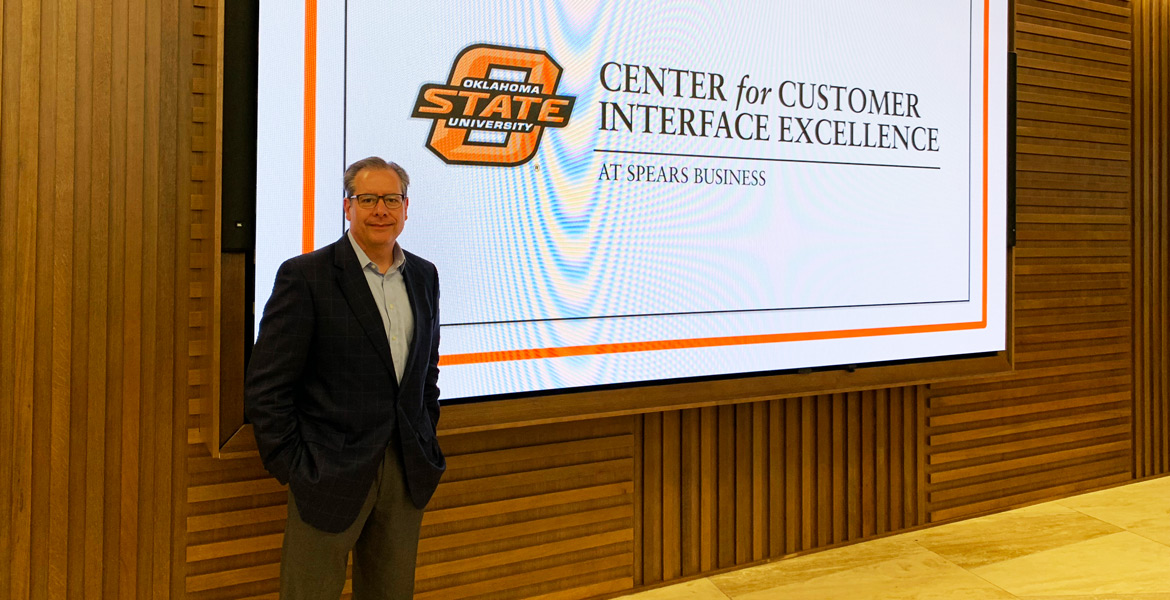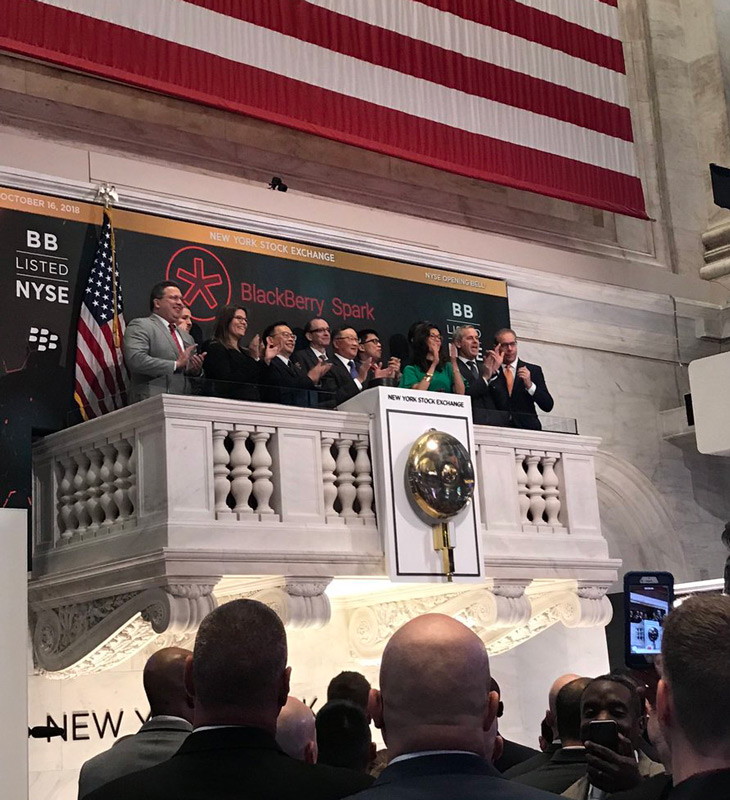
Sales sent Spears alum Carl Wiese soaring
Thursday, November 8, 2018
Spears School of Business alum Carl J. Wiese has carved out a rich career in business, excelling in varied roles with several heavyweight companies: Texas Instruments, Apple, Lucent Technologies, Cisco and now BlackBerry.
Wiese’s initial path, into sales, emerged out of necessity.
“I was fairly young,” Wiese said of his early days with Texas Instruments, “and quite frankly one of the benefits of going into sales was I got a company car, a Ford Taurus. And I needed a new car.
“That’s absolutely true. I said, ‘I get a company car. Worst-case scenario, I make no less money and I get a free car. I’m in.’
“That’s what happened and I started to have some success and enjoying it.”
Wiese, a 57-year-old Chandler, Okla., native, didn’t just have some success, he enjoyed major success, paving a journey that now finds him as a pivotal player in BlackBerry’s major turnaround from failing mobile phone manufacturer to thriving software company, as president of sales and service.
Sales was the topic when Wiese recently came home to Spears Business to speak to current students and recent grads during a name-change reveal from Center for Customer Interface Excellence to Center for Sales and Service Excellence, which focuses on discovering the truths that underlie successful customer-employee interactions and training future managers to create satisfied customers and satisfied employeesSpea.
Before the talk, Wiese sat down for a Q&A:
What is your message to Spears students when it comes to sales?
Wiese: “It’s threefold. Number one is, it’s not the easiest job, but it can be the most rewarding you ever have.
“Number two, you get a chance to manage your own career. You can be as successful as you want, work as hard as you want, that’s up to you.
“The third thing, it’s a wonderful job to do other things with, because it always starts with a customer. The more you know how to interact with a customer, you can learn to go into product marketing, you can learn to go into sales, you can learn to go into sales management; there’s lots of avenues for people who can relate to customers.”
Safe to say that sales played a major role in your career?
“Myself, I’ve had three or four different roles in my 30 years, I’ve loved every one of them. But it always started with a customer. And you start there and work your way back.
“To me, sales is one of the best places, if not the best place to start a career. And if you want to make it a 30-year career, you do it. If you want to make it a three-year career, then kind of jump someplace else, then it’s a great opportunity to do that.
“You need good salespeople in every economy. When the economy is good, you need them. And when it’s bad, you still need them. Somebody’s got to go sell something to kind of weather the downturns.”
Your presentation included a quote from Cowboys basketball coach Mike Boynton. How did that come about?
“We spent an all-access weekend with the team, seven family members. One of the things Coach Boynton does before every practice, on the practice sheet, at the top he has a theme of the day.
“On the second practice, that was the theme, that quote: ‘The only place where Success comes before Work is in the dictionary.’ I thought, ‘That is one of the most simple, most powerful things.’ I’ve used it twice in other presentations this week. That is brilliant.
“I don’t know where he got it, but when I saw it I thought that was amazing. One of the messages for the students here is, ‘Hey, I’m a kid from Chandler, Oklahoma. That’s a very modest thing. I went to school at Oklahoma State, worked hard for 30 years. And my dad drove into me the thing about work, you’ve got to work hard, nothing will be given to you.
“But that quote to me, that’s a way to put that.”
What was your OSU experience?
“It was pretty typical. Experiences have changed a lot, having had three kids go through college now, in terms of what it is and isn’t. And this university has changed dramatically. Mine was pretty simple. I had tons of great friends. I had three older brothers, they all went to business school, so I assumed that was the thing to do. Those were the hey-days of sports, so I loved some of those things. Went to school. Hung out with. Met my wife here. Had a great time.”
Do you get back to OSU often?
“I get back to every football game. I have a suite at the stadium, so that’s a good reason to get back. I come up here fairly often for anything related to the business school that they ask me to do. My oldest brother (Jon Wiese), who passed away with cancer, when he actually retired from business, he started the Riata Center.”

What drew you to BlackBerry?
“People question why I did that one. When you go to business school, the last thing you want to do is your capstone. To me, it’s my capstone. I could have stayed at Cisco a long time. But I wanted to work five to seven more years. And I wanted something to end my career with. Cisco was kind of easy, in terms of $50 billion cash, making $3 billion a quarter, had more money than they know what to do with, No. 1 every market share... You just had to show up and be aggressive and you get the job done. After 13 years, we kind of had it rolling pretty good.
“Blackberry was trying to do a turnaround, get out of the phone business and become a software company. It looked like a really interesting challenge. Nobody thought it was going to work. And I said, ‘You know what, I think I’m going to give it a try.’
“If we don’t make it work, people are going to say, ‘I told you so.’ And I don’t lose anything. If we do make it work, it’s one they write case studies about. And we’re going to make it. We’ve turned the company around. The hardest, most rewarding thing I’ve done is the past 3 1/2 years. All the things I’ve done for 30 years – do, don’t do, do this – just kind of put it together and here we are.
“This will be my swan song, without a doubt.”
The success with BlackBerry led to you ringing the opening bell on Wall Street, twice. What was that experience like?
“The first time was a year ago. Were listed on Nasdaq at the time, trying to make a move onto the big board. After we made our turnaround, they invited us to be a part of the big board, changed our listing and asked us to come ring the bell.
“This year, they came back to us, said the success is still going good, why don’t you come back on the one-year anniversary and celebrate the listing on the big board.
“It was fascinating in many ways. Like a lot of things, people probably think it’s just massive, but it’s really not that big. But it’s chaotic on the floor. And the energy and stuff they put into it, in terms of the opening and closing, is pretty phenomenal. They make it a real production for a day. The opening itself is 30 seconds. But in the morning, you have an early breakfast with the CEO of the NYSE, get a history of the NYSE. It was very educational. Tons of press there for the next two or three hours.
“Then we actually had a customer event there in the afternoon, welcoming our customers. Dinner that evening. It was a bucket list for me. If a kid from Chandler and Oklahoma State could do that… I never really thought I could, to be honest with you. I never even thought I would until a year ago. But I remember a year ago, I was wearing my orange tie and doing pistols firing on the podium.”
